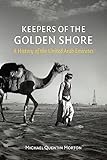Keepers of the Golden Shore : a history of the United Arab Emirates Michael Quentin Morton
Material type: TextPublication details: London : Reaktion Books, c2016.Description: 238 p. : ill., maps ; 24 cmISBN:
TextPublication details: London : Reaktion Books, c2016.Description: 238 p. : ill., maps ; 24 cmISBN: - 9781780235806
- 953.57 MO KE
| Item type | Current library | Call number | Status | Notes | Date due | Barcode | |
|---|---|---|---|---|---|---|---|
| REGULAR | University of Wollongong in Dubai Main Collection | 953.57 MO KE (Browse shelf(Opens below)) | Available | Jan2019 | T0061291 |
Includes bibliographical references (pages 226-232) and index.
The region now known as the UAE likely began as a trading post between Mesopotamia and Oman, and since that time has been the stage of important economic and cultural exchanges. It has seen the rise and fall of a thriving pearl industry, piracy, invasions and wars, and the arrival of the oil age that would make it one of the richest countries on earth. Since the early 1970s, when seven sheikhs agreed to enter into a union, it has been a sovereign nation, carrying on the resourceful spirit ;with resplendent fervor ;that the brutally inhospitable landscape has long demanded of the people. Ultimately, Morton shows that the country is not only rich in oil and money but in an extraordinarily deep history and culture.
For those who visit the United Arab Emirates (UAE), staying in its the lavish hotels and browsing in the ultra-modern shopping malls of Abu Dhabi or Dubai, the country can be a mystery, a glass and concrete creation that seems to have sprung from the desert overnight. Keepers of the Golden Shore looks behind this glossy façade, illuminating the region's history, which stretches from the ancient Arabian tribes who controlled a desolate but economically important shoreline to the ostentatious architectural wonders-bankrolled by a massive wealth of oil-that characterize it today. As Michael Quentin Morton recounts, the region now known as the UAE likely began as a trading post between Mesopotamia and Oman, and since that time has been the stage of important economic and culture exchanges. It has seen the rise and fall of a thriving pearl industry, piracy, invasions and wars, and the arrival of the oil age that would make it one of the richest countries on earth. Since the early 1970s, when seven sheikhs agreed to enter into a union, it has been a sovereign nation, carrying on the resourceful spirit-with resplendent fervor-that the brutally inhospitable landscape has long demanded of the people. Ultimately, Morton shows that the country is not only rich in oil and money but in an extraordinarily deep history and culture.
There are no comments on this title.
